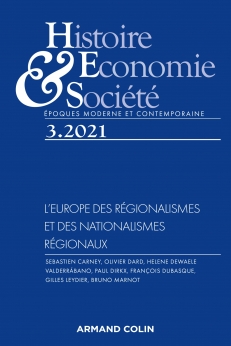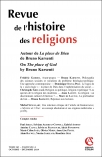
HISTOIRE, ECONOMIE ET SOCIÉTÉ (3/2021)
Pour acheter ce numéro, contactez-nous
Recevez les numéros de l'année en cours et accédez à l'intégralité des articles en ligne.
Parmi les militants bretons qui se caractérisent par leur engagement européiste, l’historiographie du nationalisme breton ne retient volontiers que deux noms : ceux de Maurice Duhamel et de Yann Fouéré. Le premier évoque une période courte, un moment particulier de l’histoire du mouvement breton, qui fut tenté par la gauche et le fédéralisme européen, à la fin des années 1920. Le second se singularise par la longévité et la constance d’une idée tout entière résumée dans le titre de son ouvrage le plus connu, L’Europe aux cent drapeaux. Si l’évocation de l’un permet d’esquiver les périodes qui fâchent, et notamment la Seconde Guerre mondiale, celle de l’autre a le mérite d’extraire le nationalisme breton de l’histoire par la vertu d’un programme presque hors du temps à force de permanence. Or, du fédéralisme des années 1920 à l’après Maastricht, en passant par l’Europe nouvelle, l’Empire nordique, la décentralisation et la mise en place des institutions européennes, la chronologie de l’intérêt des nationalistes bretons pour les projets européens peut être affinée, ses acteurs diversifiés, leurs réseaux mis en évidence. Il s’agit ici de préciser si leur engagement européiste vise bien, comme le suggère le sous-titre de l’ouvrage de Fouéré, à « servir à la construction de l’Europe », ou à servir à la destruction de la France, et ce dans quels buts.
Amongst the Breton militants who are characterised by their Europeanist commitment, the historiography of Breton nationalism readily retains only two names: those of Maurice Duhamel and Yann Fouéré. The first evokes a short period, a particular moment in the history of the Breton movement, which was tempted by the left and European federalism at the end of the 1920s. The second is singled out by the longevity and constancy of an idea that is summed up in the title of his best-known work, L’Europe aux cent drapeaux. If the evocation of the former allows one to avoid the periods that make one angry, and in particular the Second World War, that of the latter has the merit of extracting Breton nationalism from history by virtue of a programme that is almost timeless by virtue of its permanence. Now, from the federalism of the 1920s to the post-Maastricht period, via the New Europe, the Nordic Empire, decentralisation and the establishment of European institutions, the chronology of Breton nationalists’ interest in European projects can be refined, its actors diversified and their networks highlighted. The aim here is to clarify whether their commitment to Europe was, as the subtitle of Fouéré’s book suggests, to "serve the construction of Europe", or to serve the destruction of France, and for what purpose.

